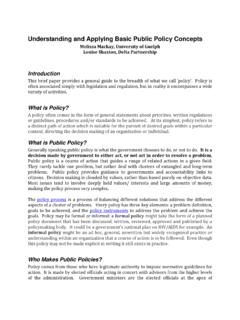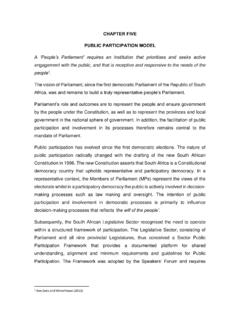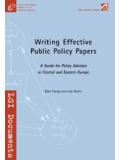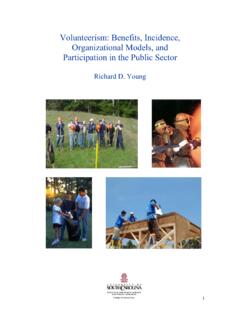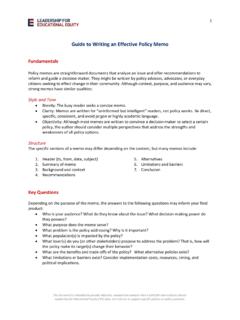Transcription of Process of public policy formulation in developing countries
1 1 Process of public policy formulation in developing countries Do Phu Hai, Faculty of public policy Graduate Academy of Social Science (GASS), Vietnam Abstract: policy formulation clearly is a critical phase of the policy Process which also is an explicit subject of policy design. The public policy formulation is part of the pre-decision phase of policy making including to craft the goals and priorities and options, costs and benefits of each options, externalities of each option. It involves identifying a set of policy alternatives and public policy tools to address a problem as a result that a prepared set of solutions is done for the final solutions from which decision makers actually choose by judging the feasibility, political acceptance, costs and benefits.
2 But the attention to policy formulation is also embedded in work on policy communities and policy networks, who does the design? (see Chap 6, Studying public policy (Howlett, 2003)). On the other words, the formulation Process will need the motivation and participation of different actors with their entrances of new actors and new ideas who will actually play their roles in the policy design Process . In the context of developing countries , this paper aims to examine the model of policy formulation and the type of feasible solutions or options for resolving the policy problems. Thus, the structure of the sub-system with two components of the discourse community and interest network will decide the participation of different policy actors and final chosen public policy solutions.
3 Key words: public policy , formulation , sub-system of public policy , policy networks, policy communities The involvement of businesses and civil society - consumers, private entrepreneurs, employees and citizens and community groups, NGOs in designing public policy is critical if the Government of developing countries are to improve the transparency, quality and effectiveness of their policies as well as establishing the legitimacy of the public policy . Socio-economic and political conditions of a country determine or shape the network of a particular policy , so we explore recent research examining linkages between models of economic development and welfare regimes in developing countries where are known as weak institutional capacity, lack of accountability to the citizen to predict the policy formulation in developing countries .
4 2 As a preliminary effort to remedy this shortcoming in the literature, we offer a political logic for the observed variation in the character of institutions of social policy established by nondemocratic regimes. Pross (1986) described the policy community as a network of individuals, groups, government departments, organizations, and agencies that dominate decision making in a specific policy field. Accordance to Hai Do (2010), the dominant model of policy formulation in developing countries is the bureaucratic politics amongst the interrupted equilibrium, organizational Process , and rational actor. Frans Van Waarden (1992) combined Rhodes s analysis with eight basic types of subsystem in Atkinson and Coleman (1992) to issue seven criteria on which the network can be varied: number and type of actors, function of networks, structure, institutionalization, and rules of conduct, power relations, and actor strategies.
5 Howlett and Ramesh (1998, 2003) continued to construct the taxonomy of discourse communities which are two dichotomous dimensions in dominant idea set and numbers of idea set can be realistically applied for the analysis in a place of policy formulation . In additional, studying the interest networks, the taxonomy of interest networks which are again dichotomous dimensions of dominant actor and number of members, so these variables are shaping the structure and behavior of the policy networks (Howlet and Ramesh, 1998, 2003). The two variables and additional dominant idea set and numbers of idea set are used to discuss on the Process of public policy formulation in developing countries .
6 In order to operate on the research question, that who does the policy design? And what are the motivation and participation of different actors with their entrances of new actors with new ideas who will actually play their roles in the policy design Process ? The research worked on the key variables such as dominant idea set and number of idea sets in the policy communities and variables of dominant actor and number of members in shaping the structure and behavior of policy networks. Discourse can also refer to dialogue, language, and conversation within the policy communities. The individual policy maker is substantially used as the unit analysis in this research. The research established the following hypotheses to address the research questions: 3 Hypothesis 1: In the subsystem, the discourse communities of the dominant idea set and number of idea sets will decide the structure of the policy communities.
7 Hypothesis 2: In the sub-system, the policy network of the dominant actors and number of members will shape the roles and motivation and participation of different actors; 1. Approaches to public policy formulation in developing world The economic development of a country depends on the quality of its policy framework, the decisions taken, especially the processes involved in formulating each decision. It is clear also that developing countries throughout the world vary considerably in their ability, and perhaps their willingness to formulate and implement policies that will generate improved development performance (Joan Corkery, Anthony Land, and Jean Bossuyt, 1995). In public policy world, the policy formulation is part of the pre-decision phase of policy making.
8 This task includes the crafting identification of a set of public policy alternatives to address the socio-economic problems, and selection Process by narrowing that set of solution in preparation for the final policy solutions for the next stage. In Cochran and Malone (1996), the policy formulation is to deal with the problem, goals and priorities, solution options for the achievement of policy objectives, cost benefit analysis, negative and positive externalities are associated with each alternative. These stages embedded into the policy cycle which is now popular in developing world. However, the specification of policy alternatives does not follow neatly from the agenda setting Process not lead neatly into implementation in Mara S.
9 Sidney (2002) which is reflected the policy formulation in developing countries . Thus, the policy formulation is a function rather than a stage where dominant actors and set ideas shaping significantly during their course of actions. Apparently, the function is more relevant for the developing countries where there are weak institutions, regulatory capacity, accountability and participation and responsibility of sub-system of government, so the formulation is the continuous Process . The attention of policy formulation is also embedded in work on subsystem, advocacy coalition, networks, and policy communities (Weible and Sabatier). The policy formulation is taken up in the agenda setting works in some researchers in 1995 to 1998 (Kingdon and Birkland); however, the policy formulation is the work of the policy communities and policy networks (Howlett and Ramesh, 2002); it is apparent that identifying the policy 4 actors, understanding their beliefs and motivations, their judgments of feasibility, and their perceptions of the political context which is relevant for developing world (ibid).
10 Thus, the policy formulation is the function of the policy making. It is really the practice oriented policy making in developing world. Also, the policy formulation within the policy communities and policy networks is reflected the actual policy in developing countries because the policy making in development work in environment with weak institutions and capacity within the communities and networks. 2. policy formulation in developing countries policy design Most of policy sciences have known that the policy formulation uses the concept of policy design to emerge in response to implementation studies of policy systems which responsible for policy failure in 1970s-1980s. Most of policy design theorists given that the causal chain is the main cause of policies success or failure because the policy designs contribute to policy outcomes (Hai Do, 2012).
